Master these 2 super frequent words in Spanish to chat like a native.
Spanish speakers have a set of frequent words in Spanish that we use all the time. These are called high-frequency words and learning them will improve your Spanish fluency and comprehension. First, you will understand conversation more easily since there is a high chance you will hear these words. Also, if you use them, you will sound more natural.
Two phrases will upgrade your Spanish: “darse cuenta” and “enterarse.” Both relate to becoming aware or finding out information, but they are used differently and can carry unique connotations. Let’s get into their meanings, usage, and differences to enhance your Spanish proficiency.
Darse cuenta- Meaning and use
“Darse cuenta” is one of these frequent words in Spanish that you want to add to your vocabulary. It translates to “to realize” or “to become aware of” in English. This phrase is often used when someone suddenly becomes conscious of something they were previously unaware of.
Mind the false friend
“False friends can be tricky for most language learners, and ‘realize‘ in English and ‘realizar‘ in Spanish are a great example. ‘Realize’ means to become aware of something in English, whereas ‘realizar’ in Spanish means to carry out or achieve something. For instance, if you say ‘realizar un sueño,’ you’re talking about fulfilling a dream, not becoming aware of it. Additionally, realizar tends to be a more formal word used in fewer contexts. Understanding these distinctions when you learn Spanish is crucial to improve Spanish fluency, as using ‘realizar’ when thinking of realize can lead to confusion and misunderstandings. By recognizing and avoiding these false friends, you can significantly enhance your Spanish communication skills.
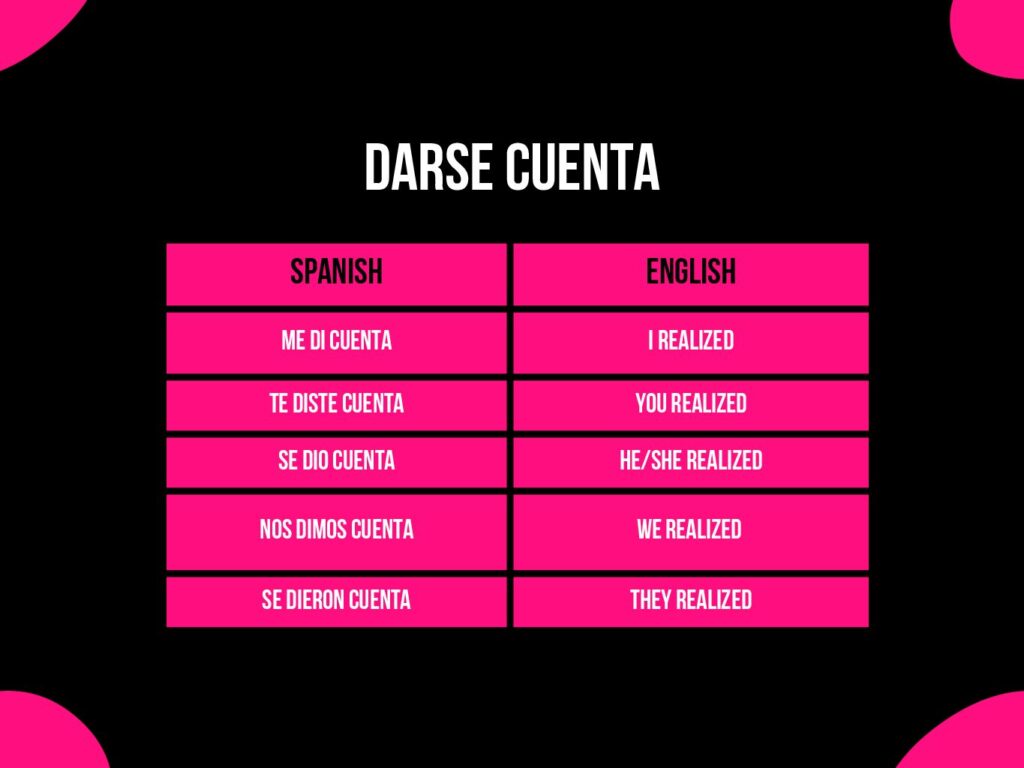
Darse cuenta- Real-life examples

“Darse cuenta” is often used in situations where the realization is sudden or where the awareness was previously lacking. It can refer to both abstract realizations (ideas, concepts) and concrete observations (physical objects, situations).
Enterarse- Meaning and use
“Enterarse” is another super frequent word in Spanish you want to add to your vocabulary bank to improve your Spanish fluency. It translates to “to find out” or “to become informed” in English. This phrase is used when someone receives information or learns about something, typically from an external source.
“Enterarse” is also a reflexive verb and follows the same pattern of reflexive pronouns: me, te, se, nos, se. Good news is that it is a regular verb, so you only need to replace the -AR ending of enterar with the form and tense you need. See my example conjugation in pretérito indefinido.
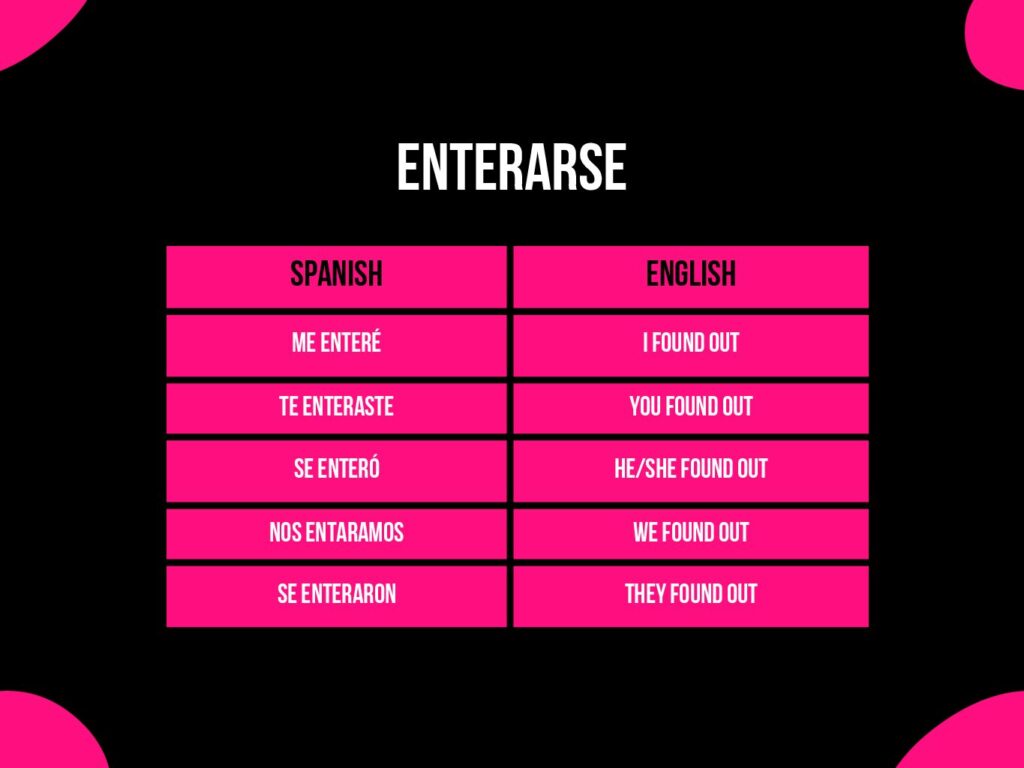
Enterarse- Real-life examples

“Enterarse” is used when the emphasis is on the acquisition of new information. It often implies that the information came from an external source, such as the news, a friend, or a report..
Learn the difference between these two frequent words in Spanish
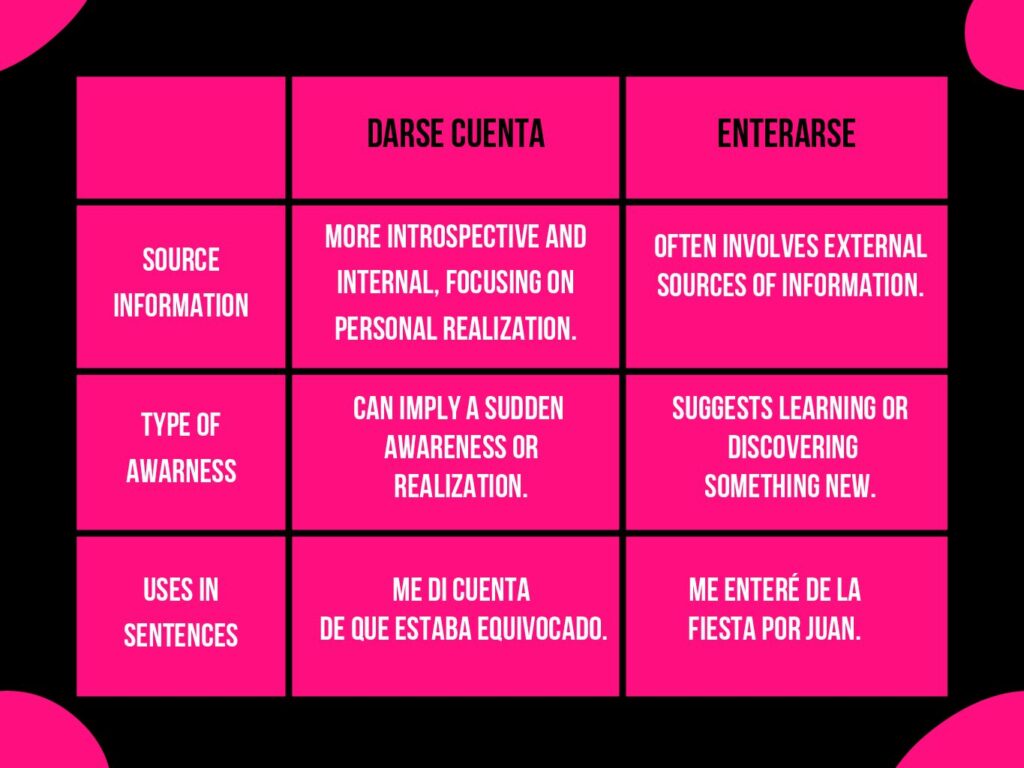
In Summary
By understanding these nuances, you can use “darse cuenta” and “enterarse” more accurately and naturally in your Spanish conversations. Remember these frequent Spanish words will keep in being part of what you hear and they must become part of your Spanish vocabulary. Practice with real-life examples, and soon these phrases will become second nature to you.
Hear it from Belén
This summary video will enhance your understanding of these two frequent Spanish words. To get more free Spanish lessons and tips to improve and learn, visit our Youtube channel.
If this made you “realize” it is time to take Spanish learning more seriously and methodically to ensure greater results, a Spanish teacher can be of great help. Check our offer for in-person beginner and intermediate group classes in Tamarindo, and online lessons for upper intermediate or advanced learners. Or, if you are a private lesson person, check out our offer for private lessons or tell us more about you so that we can custom create a program for you.

1 Powerful insight will transform your reasons to learn Spanish for ever!
If you think you learn Spanish to travel or live in Latin America, you are doing much more than that! You are embarking on a journey far beyond that, and that deserves recognition. Language shapes our perception of the world, granting us greater insight into others, and fostering a more profound understanding and acceptance of…
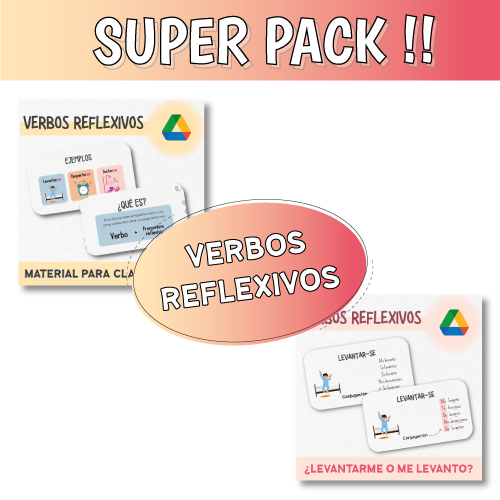
99 diapositivas que no fallan para enseñar los Verbos Reflexivos en tu clase de ELE en línea.
¿Estás buscando recursos efectivos y atractivos para enseñar verbos reflexivos en tus clases de español en línea? Estoy tan feliz con éste nuevo set de diapositivas de verbos reflexivos que tengo que compartirlo con vos profe de ELE! Están especialmente diseñadas para ayudar a los profesores a introducir, estudiar y practicar la conjugación de los…
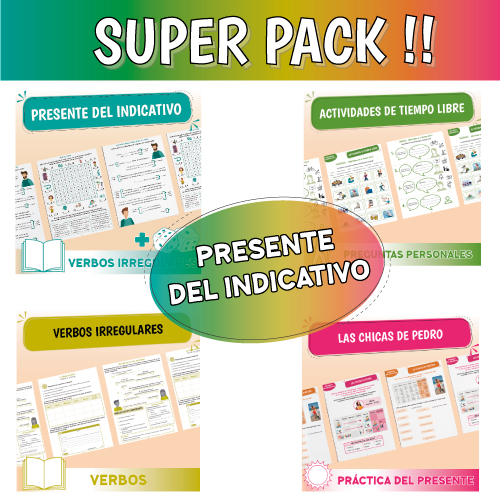
¡Actividades de ELE para practicar los pretéritos con adultos! 4 worksheets para inspirar a tus alumnos.
Si enseñas el pasado en tus clase de ELE, necesitas ayuda. Por eso te comparto estas actividades de ELE para practicar los pretéritos con adultos. Realmente motivan y divierten a tus estudiantes y les permiten practicar los pretéritos en español de una manera significativa con temas que se conectan con su realidad. Aquí te dejo…
Transform how you learn Spanish with these 10 cool uses of GET.
How do say get in Spanish? How often have you asked this to your Spanish teacher or when you learn Spanish on your own? This one tool will help you optimize your translation skills and learn Spanish faster. As a beginner Spanish learner, you are probably relying heavily on word-to-word translation. This post will help…
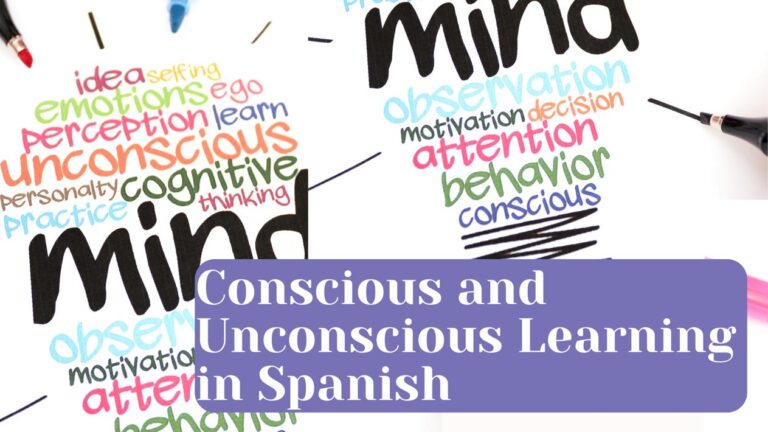
2 things you need to know about your brain to learn Spanish more efficiently.
When you learn Spanish, one of the most exciting and rewarding moments is when you find yourself using a word that you didn’t even know you knew!! It took no effort and it waltzed out of your mouth with grace and precision leaving yourself shocked. These are the moments that we need to foster and…

Frustrated and stuck? 3 factors affecting your Spanish learning.
Hey there! Have you considered that there might be three factors slowing down your Spanish learning? Don’t worry, identifying them could help you get back on track. Let’s find out what these factors are and how we can improve them. 1. Damaging self-dialogue when learning Spanish I am not good at this! I’ll never get…



